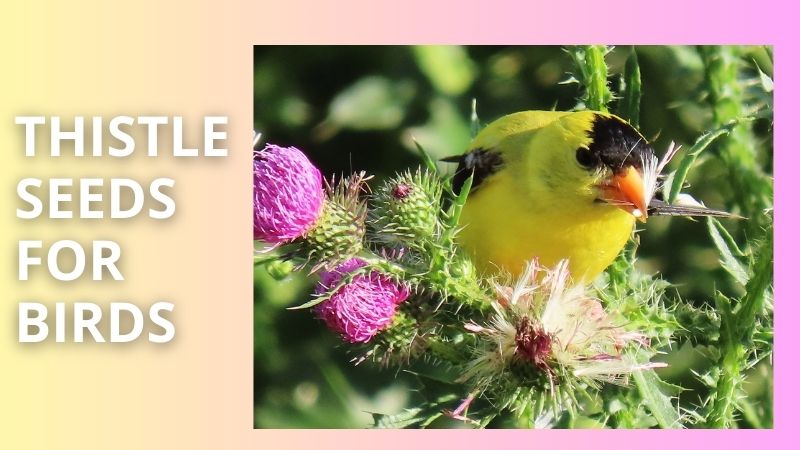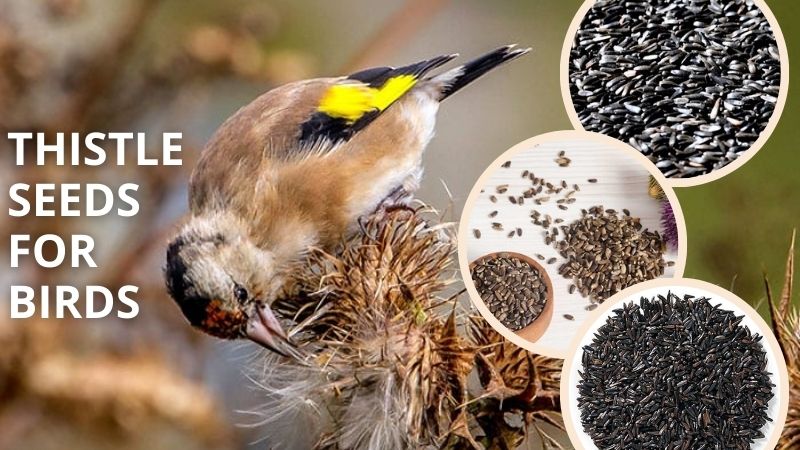GARDEN DECORATION
Thistle Seeds for Birds: Benefits and Feeding Tips
Thistle seeds, often referred to as “nyjer” or “niger” seeds, are a favorite among many bird enthusiasts due to their high nutritional value and the diverse range of birds they attract. These tiny black seeds, originating from the African yellow daisy (Guizotia abyssinica), are a powerhouse of nutrition and are especially popular among finches, sparrows, and other small songbirds. In this article, Floral Garden Ideas will explore the benefits of thistle seeds for birds and provide practical feeding tips for bird lovers who want to attract these feathered friends to their gardens.
The Nutritional Benefits of Thistle Seeds
Thistle seeds are packed with essential nutrients that are beneficial for birds. They are particularly rich in fats and oils, which are crucial for birds’ energy needs, especially during the colder months when food is scarce. These seeds contain about 35-40% fat, making them an excellent energy source for birds. In addition to fats, thistle seeds are also a good source of protein, which is vital for birds’ muscle development and overall health.
Another key benefit of thistle seeds is their high fiber content. Fiber is important for birds’ digestive health, helping to ensure that their gastrointestinal system functions properly. Thistle seeds also contain essential vitamins and minerals, such as calcium, magnesium, and phosphorus, which contribute to strong bones and healthy feathers.
Thistle Seeds for Birds – Birds That Love Thistle Seeds
One of the primary reasons bird enthusiasts choose to offer thistle seeds is the wide variety of birds they attract. Among the most common visitors to a thistle seed feeder are finches, particularly the American Goldfinch (Spinus tristis), which is often called the “thistle bird” because of its preference for these seeds. Other finches, such as the Lesser Goldfinch, House Finch, and Purple Finch, also enjoy thistle seeds.
Siskins, such as the Pine Siskin (Spinus pinus), are another group of birds that are drawn to thistle seeds. These small, energetic birds are often seen flocking to feeders during the winter months. Redpolls, another species of small finch, are also frequent visitors to thistle seed feeders, particularly in northern regions.
In addition to finches, other small songbirds like chickadees, nuthatches, and sparrows are known to enjoy thistle seeds. The seeds’ small size and high nutritional content make them an ideal food source for these birds.
How to Feed Thistle Seeds to Birds
Feeding thistle seeds to birds requires some specific considerations to ensure the seeds remain fresh and accessible to the birds. Here are some tips for effectively feeding thistle seeds:
Choose the Right Feeder
Thistle seeds are very small, so it’s important to use a feeder designed specifically for these seeds. Tube feeders with small feeding ports are ideal, as they allow birds to access the seeds without spilling them. Mesh sock feeders, made from fine mesh, are also popular for feeding thistle seeds. These feeders allow birds to cling to the sides and peck at the seeds through the mesh.
Keep Seeds Fresh
Thistle seeds can spoil quickly, especially in humid or wet conditions. It’s important to keep the seeds dry by using a feeder with good drainage. Additionally, only fill the feeder with enough seeds to last a few days, as this will reduce the risk of the seeds becoming moldy or rancid.
Location Matters
Place the feeder in a location that is safe and visible to birds but away from predators like cats. Hanging the feeder near shrubs or trees can provide birds with a quick escape route if needed. However, avoid placing the feeder too close to dense cover where predators might hide.
Clean Regularly
To prevent the spread of disease, it’s essential to clean the feeder regularly. Wash it with a solution of mild soap and water, rinse thoroughly, and allow it to dry completely before refilling it with fresh seeds. This will help keep the birds healthy and prevent the growth of mold and bacteria.
Offer Thistle Seeds Year-Round
While thistle seeds are especially valuable in the winter when food is scarce, they can be offered year-round. In the summer, they provide energy to birds during their breeding season, and in the fall, they help birds build up fat reserves for migration.
Avoiding Common Problems with Thistle Seeds

Although thistle seeds are highly beneficial, there are some common challenges that bird enthusiasts may encounter when offering them. Being aware of these issues can help you avoid them and ensure that your feeding station remains a popular spot for birds.
- Seed Spoilage: As mentioned earlier, thistle seeds can spoil quickly, especially in humid environments. To prevent this, store seeds in a cool, dry place and check feeders regularly to ensure the seeds are fresh.
- Picky Eaters: Not all birds are attracted to thistle seeds, and some may prefer other types of food. If you find that birds are not flocking to your thistle seed feeder, try offering a mix of seeds, such as sunflower seeds or a wild bird seed blend, to attract a wider variety of birds.
- Waste: Birds can be messy eaters, and it’s common to find seeds scattered beneath the feeder. To minimize waste, consider using a seed catcher tray below the feeder. This will catch spilled seeds and provide a platform for ground-feeding birds.
The Environmental Impact of Thistle Seeds
Bird enthusiasts should be mindful of the environmental impact of their feeding practices. Thistle seeds are often imported from regions in Africa and Asia, raising concerns about sustainability and the potential introduction of invasive species. However, most commercially available thistle seeds are heat-treated to prevent them from germinating, reducing the risk of unwanted plants growing in your garden.
If you are concerned about the environmental impact, consider purchasing thistle seeds from a reputable supplier that sources them sustainably. Alternatively, you can explore native seed options that provide similar nutritional benefits to birds.
Final Thoughts
Thistle seeds are an excellent choice for bird lovers who want to attract a variety of small songbirds to their gardens. Their high nutritional content, combined with the wide range of birds they attract, makes them a favorite among bird enthusiasts. By choosing the right feeder, keeping seeds fresh, and placing feeders in a safe and accessible location, you can enjoy the beauty and joy of watching finches, siskins, and other small birds flock to your thistle seed feeder year-round.


